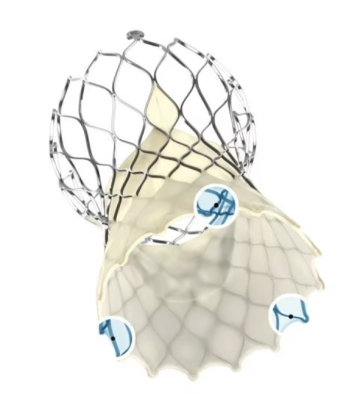
March 12, 2024 — Medtronic plc, a global leader in healthcare technology, today announced two late-breaking data presentations on four-year outcomes from the Evolut Low Risk Trial. A cost-effectiveness analysis demonstrates the positive economic value of transcatheter aortic valve replacement (TAVR) using Evolut TAVR compared to surgical aortic valve replacement (SAVR) for low-risk patients. In addition, contemporary data from the Evolut Low Risk Trial reinforces the robust long-term clinical outcomes of Evolut TAVR compared to SAVR in low-risk patients. The findings were presented as late-breaking clinical trials at the Cardiovascular Research Technologies (CRT) 2024 Conference.
The Medtronic Evolut TAVR platform includes devices less invasive than traditional open-heart surgery for the treatment of symptomatic severe aortic stenosis.
“At Medtronic, we continue to emphasize that valve design matters. These data further exemplify Medtronic’s dedication to providing differentiated treatment options like the Evolut TAVR platform to reach the growing population of low-risk symptomatic severe aortic stenosis patients,” said Nina Goodheart, Senior Vice President and President, Structural Heart & Aortic, which is part of the Cardiovascular Portfolio at Medtronic. “We are proud of the excellent clinical outcomes and sustained valve performance1,2, effectiveness, and economic benefits of Evolut TAVR and are committed to advancing evidence around the long-term clinical and economic patient benefits.”
Evolut Low Risk Trial: Cost-Effectiveness Analysis
Evolut Low Risk Trial four-year data were analyzed to determine cost-effectiveness results of TAVR versus SAVR across the spectrum of surgical mortality risk. The findings showed a strong economic benefit of Evolut TAVR for low-risk patients from a U.S. healthcare system perspective.
The results demonstrate Evolut TAVR resulted in a lifetime incremental cost-effectiveness ratio (ICER) of $2,119 per quality-adjusted life year (QALY) gained, which is consistent with high economic value.3 At 30 days, the estimated cost (including index procedure, hospitalization, and rehabilitation) was $5,189 lower with TAVR compared with SAVR ($45,887 versus $51,075, respectively). Within the US healthcare system, current ACC/AHA guidelines consider an ICER <$50,000 per QALY gained to indicate “high value” while an ICER between $50,000 and $150,000 per QALY gained is considered “intermediate value” 2022 Medicare data was used to obtain contemporary cost estimates for TAVR and SAVR index hospitalization along with key cost drivers.
"As more and more patients are diagnosed with aortic stenosis and undergo TAVR, it is important to use devices that offer exceptional results for patients, while also delivering economic value to the healthcare system. These data complement the extensive body of clinical evidence for Evolut TAVR and demonstrate that it is a solution that provides substantial benefit to our patients in a highly cost-effective manner," said David J. Cohen, MD, MSc, Director of Clinical and Outcomes Research at the Cardiovascular Research Foundation, Director of Academic Affairs at St. Francis Hospital, and faculty member at Columbia University.
4-Year Outcomes: SAVR with Contemporary Valves Versus Self-Expanding TAVR Outcomes
Findings from the Evolut Low Risk Trial four-year data comparing TAVR versus SAVR in patients with severe aortic stenosis were re-evaluated with the exclusion of Trifecta surgical valves that were previously withdrawn from the market due to durability concerns. This analysis included the evaluation of 1,292 attempted implants in patients who were randomized to TAVR with a self-expanding, supra-annular CoreValve/Evolut R/PRO valve or to SAVR.
In this contemporary analysis, all-cause mortality or disabling stroke rates at four years were 10.7% in the Evolut TAVR cohort compared to 14.2% in the SAVR cohort (p=0.06). Evolut TAVR had significantly better hemodynamics, an indicator of valve durability, compared to SAVR using contemporary valves (mean gradient 9.8 mmHg TAVR; 11.8 mmHg SAVR; p<0.001) at four years.
"The Evolut TAVR System continues to demonstrate positive clinical outcomes compared to SAVR. This new data supports the growing body of evidence for TAVR at a time when aortic stenosis is the most common surgically managed heart valve disease," said Basel Ramlawi, MD, System Chief of Cardiothoracic Surgery at Main Line Health System and Co-Director of the Lankenau Heart Institute. “We are encouraged by the results of this contemporary data, showing that we can help improve outcomes in patients with less risk of mortality and disabling stroke compared to the surgical option.”
About the Evolut Low Risk Trial
The Evolut Low Risk Trial was a prospective, randomized, multicenter, noninferiority study to assess the safety and efficacy of the Evolut TAVR System compared to SAVR in low-risk patients. Low-risk patients, defined as having a low predictive risk of 30-day surgical mortality were randomized to TAVR with a Medtronic self-expanding, supra-annular Evolut R, PRO, or CoreValve bioprosthesis versus SAVR. A total of 1,414 patients underwent attempted implant (730 TAVR; 684 SAVR).
For more information: www.medtronic.com


 February 03, 2026
February 03, 2026 









